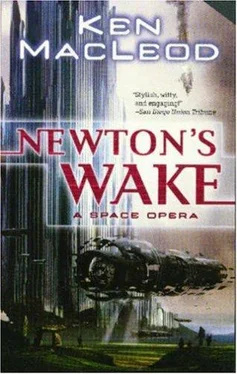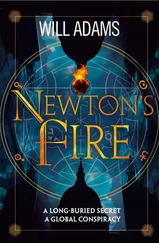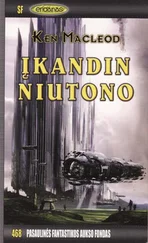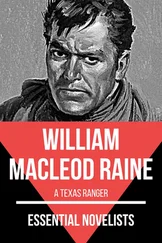T
he lab smelled of cold and electricity. It occupied most of the otherwise empty hold. The space was large and bare, lit by portable spots and floods—no luminous ceiling or self-cleaning carpets here. Lucinda and Armand hung back as Johnstone and Yamata talked Higgins and Lamont around the QTD—transmitter and receiver set up about ten metres apart—and the screens and desks connected to the instrumentation with which the Knights had, with great and characteristic caution, interacted remotely with the relic. She eyed the two big round bulks of the teleportation device with disquiet. It was for these that she had died, and she wondered with what thoughts her original had looked upon them. To Johnstone and Higgins the equivalent thoughts would be memory, not speculation.
Watching Lamont troubled her more. Since coming into the lab he had shrugged off all his awkwardness. She couldn’t make out everything he was saying, or understand all of what she could, but his every intonation and glance and gesture screamed one thing at her: Rapture-fucker! He and Johnstone and Higgins were so instantly and blatantly in cahoots that if she’d come upon the scene as a stranger she’d have assumed they’d known each other for years.
‘You seemed to know him,’ she said to Armand.
‘Not personally,’ he said. ‘By repute, and’—he tapped his temple—‘this tweaked memory we have for people. He was a rich man once, and he’ll be again even if there’s not a gram of useful ore in that asteroid and his ship is a wreck. With his experiences his credit and interest will be sky-high, at least for a while. No doubt he’ll find some way to leverage it into a more durable competence.’
‘Having his own stardrive should help,’ said Lucinda dryly. ‘Especially if the skein is fucked.’
Armand looked at her sidelong. ‘There is that,’ he said, like it hadn’t occurred to him. He shifted, looked around, and sat on the edge of a lab-bench. ‘The matter that Lamont raised,’ he went on. ‘I would appreciate your opinion on it.’
Lucinda spread her hands. ‘Higgins works for us, sure. Johnstone betrayed us, to the Knights.’
‘So I’ve heard.’
‘The point is, these two are what we call Rapture-fuckers. Lightning-chasers. They have a fascination with this stuff and they’ll take risks the Knights won’t. All well and good right now, maybe, but it means they each have their own agendas. I wouldn’t trust either of them an inch. As for your man Lamont, he may be a good patriot of Eurydice but he’s one of them. I know it.’
‘He seems quite taken with your woman Higgins,’ said Armand. He smiled. ‘I could venture a coarse remark, but will restrict myself to saying that a man who can screw a ship is unlikely to have a problem in that respect.’
Lucinda gave an appreciative dirty laugh. ‘Maybe that’ll be enough for them to maintain a united front.’
‘A united front against whom, eh?’
Lucinda jerked her head back. ‘The Knights. I know the immediate problem is the war machines, but let’s not forget the main enemy.’
‘They are not the enemy,’ Armand said mildly. ‘They are our rivals, and temporary allies. Let us not forget that.’
‘And what are we?’
‘Our agreement stands,’ said Armand.
Since the agreement had already been pretty much fulfilled from his side at least, this was not saying a lot. Lucinda returned him a wary smile. He leaned sideways a little, looking past her.
‘Our three champions are about to start work,’ he said.
Lucinda turned to see the Rapture-fuckers a good way off in the lab, sitting in front of a screen, their backs to where she and Armand watched. She gazed at a distant mercurial ripple of hair and thought, You hang in there for us, girl!
T
he interface was not as foreign as Lamont had expected. Its underlying architecture and ergonomics had a common ancestry with those used on Eurydice. Fundamentally it was as familiar to him as the lineaments of the Hungry Dragon . No doubt all human and even posthuman software could be traced back through genealogical trees of slouching, slope-shouldered code-geeks and capitalists to the same Olduvai in Silicon Valley. The instruments with which it interacted were outside the ship, encircling the relic at a respectful range. Their infinitesimally subtle input from deep quantum-level eavesdropping on electronic interactions within the vast artefact were analysed and collated by the ship’s immensely powerful computer: some of its components were themselves cannibalised from posthuman tech. The whole array quivered on the verge of some sentience deeper and more recalcitrant than that of the Hungry Dragon , or even of Eurydice’s Leontieff matrices. Any unscheduled self-upgrading would trigger its hardwired EMP generator. Likewise independent of its core processing were the firewalls against optic-nerve neural hacks. This seemed enough to reassure his new colleagues, and was therefore enough for him.
Strangely, despite their experience’s being deeper and wider, they deferred to his, recent and specific. Yamata stood well back; Johnstone and Higgins, one by one, nodded. He leaned forward and slid his hands into the access field. Like the Knights, Lamont had long dispensed with visual and tactile feedback from such devices; his hands and fingers moved by ingrained habit in the combination of gesture, chording, and keyboarding that had, even before the Hard Rapture, become as invariant as any martial art. The wide screen lit up without a flicker. The first iteration showed the point reached by Johnstone’s work on the QTD’s control system, which had provided a key to the logic of the relic’s major function, the generation of the wormhole skein.
Lamont shaped an inference chain based on his long sessions with the ship, which had in some measure succeeded in ridding it of the viral incubus, or at least limiting its effect. It was all from memory; he wished he had the ship with him. He checked the formulation over once, twice, then launched it into the virtual depths like a molecule cruising the bloodstream for a receptor.
The response was immediate. Something ferocious threw itself against the firewall. The screen went blank.
Yamata sighed delicately. ‘Restoring power,’ he said.
Lamont restored the formulation and reexamined it, checking its premises.
‘Ah,’ said Johnstone. ‘Nice one. But … allow me.’
Lamont relinquished the structure. Johnstone leaned forward, hands flexing. The formulation scrolled, disappeared, emerged from a mathematical transformation that turned it conceptually inside out.
‘Sugarcoating,’ murmured Higgins. ‘Uh-huh.’
This one lasted almost two seconds, an era in processing time but not enough for it to get through. The screen crashed again.
‘Restoring power,’ said Yamata. The screen came back up. They stared at it for a while.
‘I have an idea,’ said Higgins.
‘One moment,’ said Yamata. He motioned to Johnstone. ‘Look, here is the power switch. I shall be better occupied on the control deck.’
Johnstone nodded. Yamata went out.
‘OK,’ Johnstone said. ‘Let’s see what you’ve got.’
Higgins’s new structure came up, failed, was modified; and so it went on.
‘Shit,’ said Johnstone, sitting down again for the tenth time. ‘Don’t these guys have technicians ?’
After a while Lamont became aware that Armand and Carlyle had followed Yamata’s example, and left. Lamont didn’t know how much time had passed—an hour, perhaps, and he was leaning back, hands behind his head, staring at the screen—when his comms tickled. He twitched it up, irritated at the interuption.
‘Yes?’
‘Your ship is pinging you,’ Carlyle’s voice told him. ‘Do you want me to patch it through?’
Читать дальше












